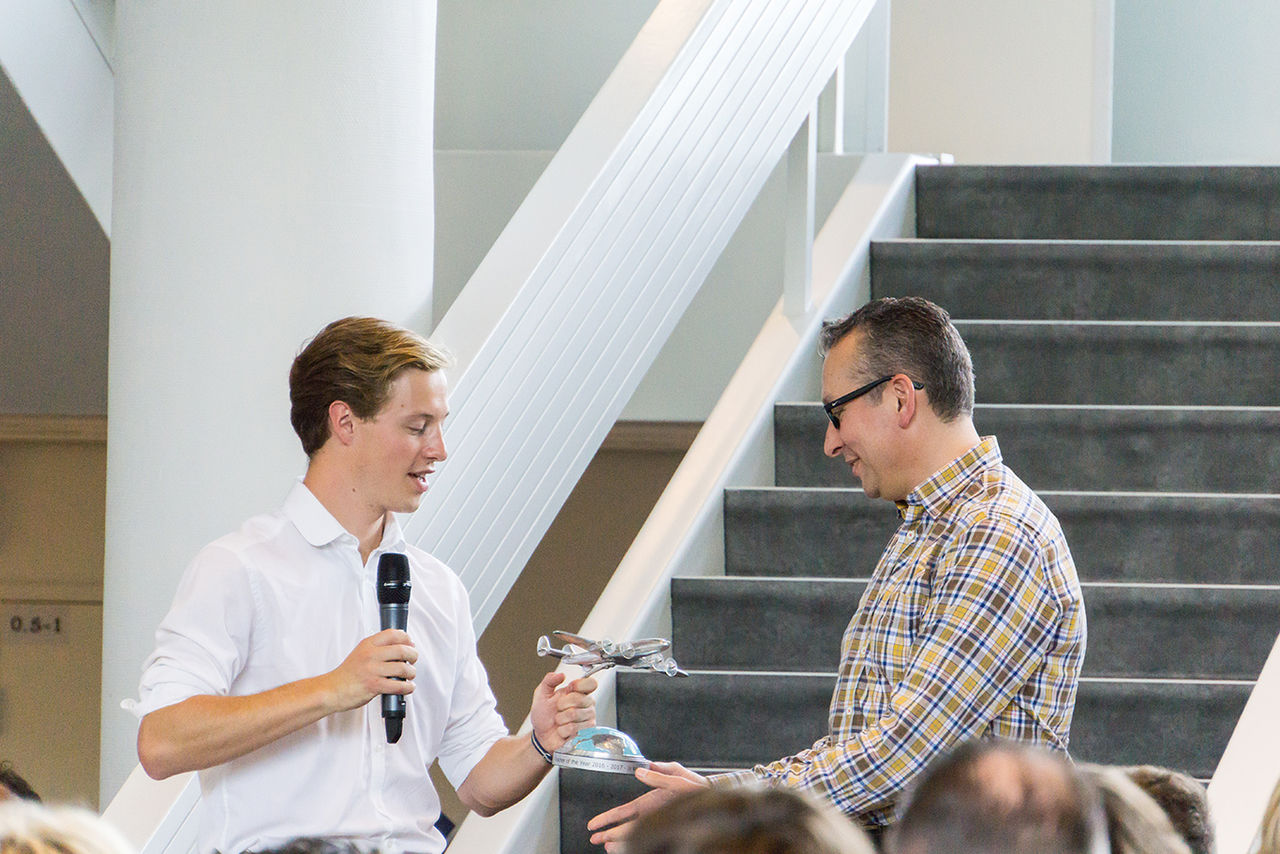
Space Engineering lecturer Kevin Cowan wants to teach his students the essence of understanding. Since this September, the Aerospace Engineering Teacher of the Year Award 2016-2017 shines on the left corner of his desk. ‘You know, that’s not there to show off,’ Cowan says. ‘It’s there to remind me that it actually happened, that what I do is appreciated.’
Cowan earned his bachelor’s degree in Texas, USA and his master’s at the faculty of Aerospace Engineering at TU Delft, where he now teaches courses in Space Engineering. He also earned an MBA and worked in strategic and financial advice for numerous organisations, amongst which the British government. ‘It was interesting work, but at some point I started wondering: how can I make a difference in this world?’ He remembered how certain lecturers during his studies (amongst whom: Ron Noomen) inspired him in the classroom. ‘They didn’t just explain, they exposed the magic of a subject. It sounds cliché, but if you know how to light that kind of fire in somebody’s mind, they can face any challenge later on.’ Cowan decided he would do his part by teaching.
Curious like Newton
Cowan teaches among other courses the MSc courses Astrodynamics I and II with his colleague Eelco Doornbos. The main textbook, titled ‘Fundamentals of Astrodynamics’, is full of formulas and text. How do you go about teaching such a heavy-duty subject? ‘I start with something fundamental that all students can relate to. Then we peel the formula apart. Do you really understand what it is about? Or have you simply memorised the formula? Observing and memorising is useful, but it cannot help you to predict anything, to create something new. If we take an idea apart and understand all the different building blocks that it is composed of, we can use those blocks to build anything.’
Cowan refers to Newton. ‘Imagine you are sitting beside Newton. He is sitting in his office behind his desk with his paper and quill. There is a candle on the corner of his desk, lightning up the room. He gazes outside, up towards the stars, and wonders: ‘how does it all work?’ I try to teach students this ‘feel for physics’, the wonder and the essence of understanding it. You don’t actually need Google or a computer to grasp it.’
Bells and whistles
‘At first I was not very fond of online education,’ Cowan says. ‘It was just another way of delivering material to students, although for that it can be useful. In the meantime, I’ve come to appreciate its surprising benefits. Nevertheless, it can’t replace the human-to-human interaction in the classroom. We should be careful not to get distracted by all the bells and whistles of online tools.’ What is the added value of teaching in a classroom? Cowan: ‘There are three pillars in education: knowledge, skills and motivation. If someone has only some of the first two but tons of motivation, he or she can get very far. You can move mountains with motivation. Motivating students, actually connecting with them and getting into a real, thoughtful conversation cannot happen without direct contact. If you, as a teacher, are just transferring information to students, something a computer can do as well, you will be out of a job soon. No, you should be out of a job soon.’
Cowan doesn’t see a world in which education is only offered online. ‘That would be suboptimal,’ he says. ‘If we want to tackle the challenges we are now facing in the world, we need to work together. If we don’t, we are in a heap of trouble. Universities are the cauldrons of change. We need to step up and accept responsibility — for guiding students to be active, life-long learners rather than passive recipients of knowledge — and for guiding students to take a pro-active role in improving society and our stewardship of the planet, to use their knowledge, skills, and motivation to be a force for good.’